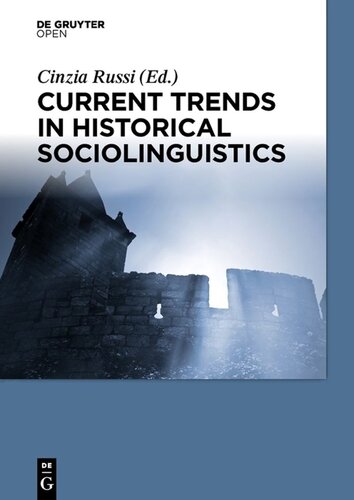

Most ebook files are in PDF format, so you can easily read them using various software such as Foxit Reader or directly on the Google Chrome browser.
Some ebook files are released by publishers in other formats such as .awz, .mobi, .epub, .fb2, etc. You may need to install specific software to read these formats on mobile/PC, such as Calibre.
Please read the tutorial at this link: https://ebookbell.com/faq
We offer FREE conversion to the popular formats you request; however, this may take some time. Therefore, right after payment, please email us, and we will try to provide the service as quickly as possible.
For some exceptional file formats or broken links (if any), please refrain from opening any disputes. Instead, email us first, and we will try to assist within a maximum of 6 hours.
EbookBell Team

0.0
0 reviewsHistorical sociolinguistics has now established itself as a separate independent field of linguistic inquiry, and the impact of its theoretical and empirical advances are reflected in a thriving body of publications of various types. This volume adds to this flourishing array by presenting nine original studies by highly accomplished scholars holding a prominent reputation in the field. The overarching objective of the volume is to call attention to contemporary trends and innovative developments in the discipline and, more generally, to highlight current research on the relationship between sociolinguistics and historical linguistics, social motivations of language variation and change, and corpus-based studies. The overall interdisciplinary nature of the contributions, the variety of languages they examine and the range of themes they address are distinguishing features of the book, which also make it appealing to a wider readership. The general themes covered by the volume include how to define the historical and social dimensions in historical sociolinguistics research, historical second-language use and multilingualism, the role and relevance played by linguistic ideologies and attitudes in language choices, usage, policy (standardization and preservation), and language death. More specific topics addressed are the linguistic strategies employed to convey and defend religious ideology or to heighten the overall persuasiveness of the information provided. Controversial and/or under-researched issues are tackled, such as authorship and gender in the study of private documents, the regularization and standardization of English orthography, and the issue of speakers’ awareness of the dissociation between spoken and written language. In addition, several contributions are methodologically linked by employing data from epistolary correspondence.
historical sociolinguistics, historical linguistics, language change